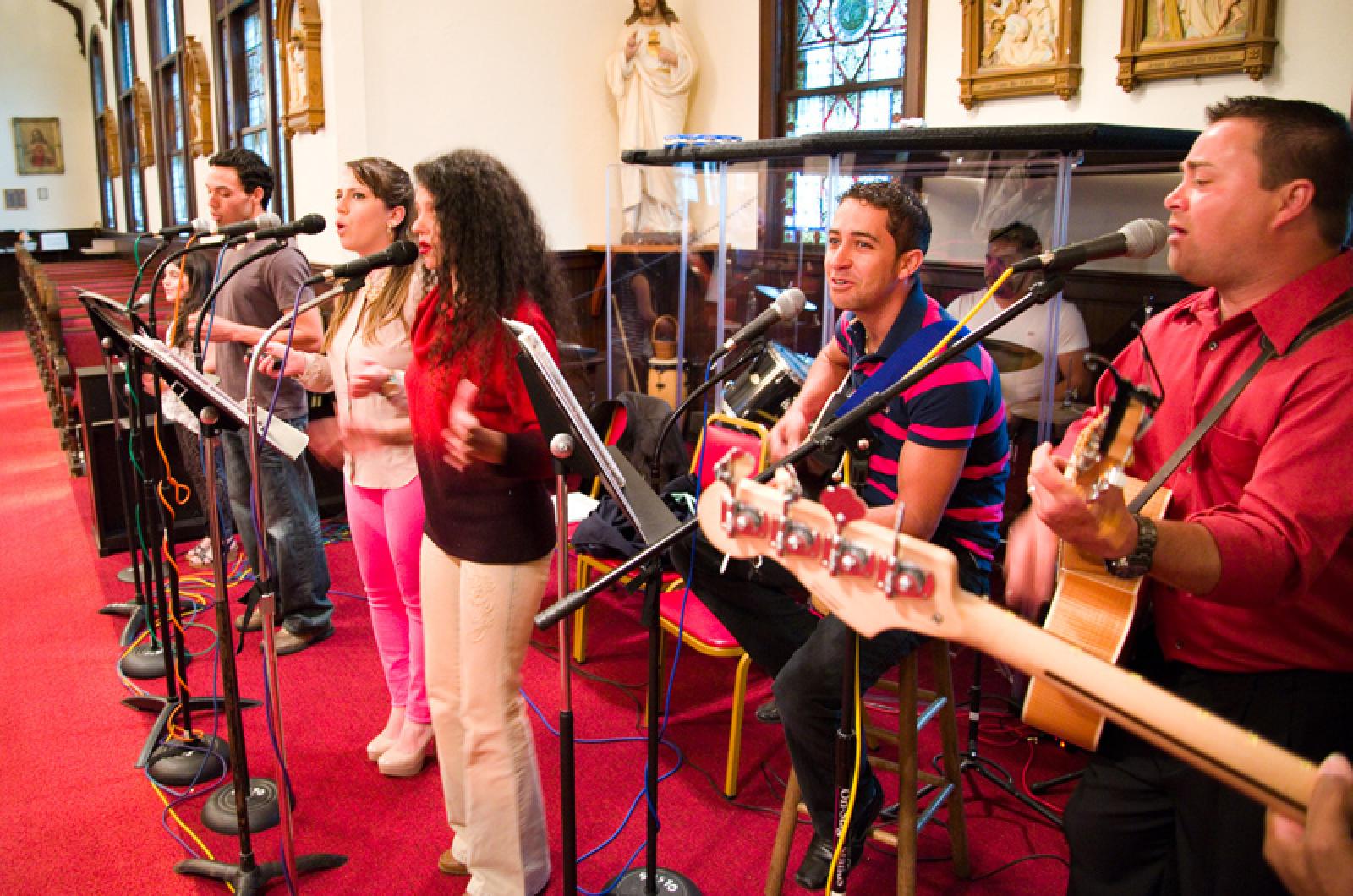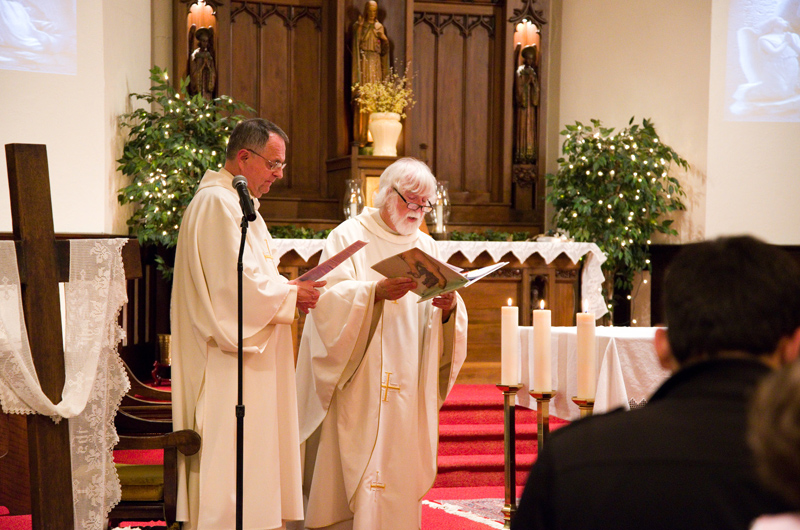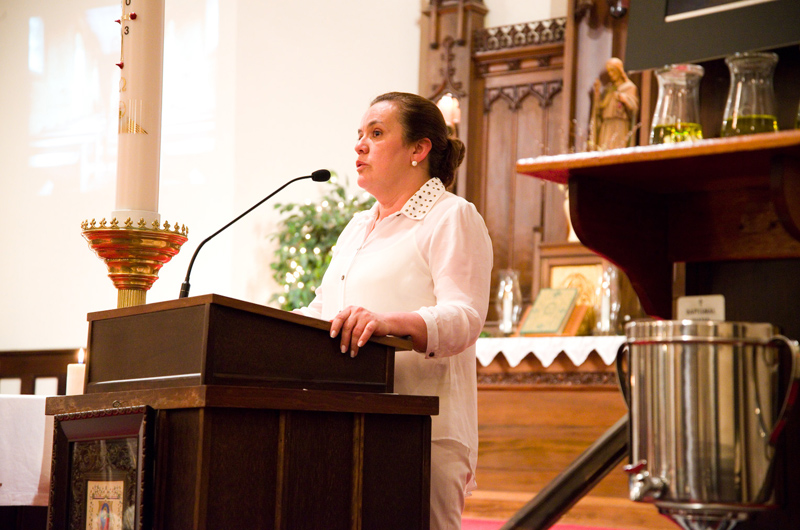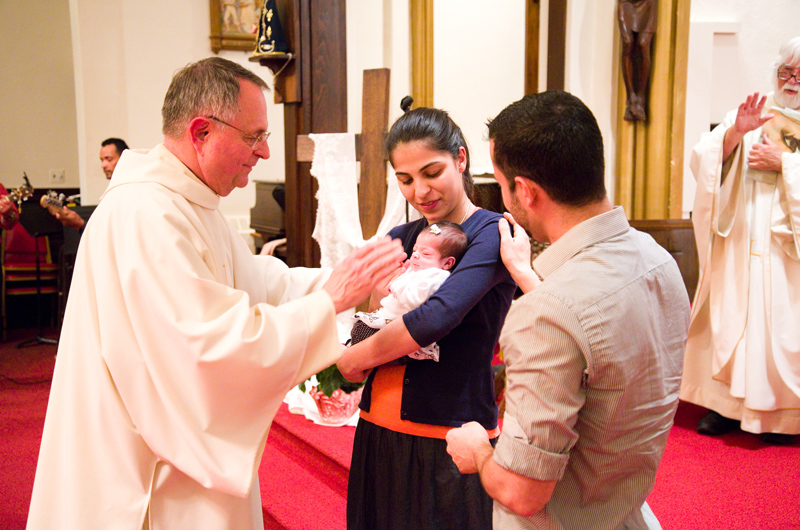Last year Good Shepherd Parish in Oak Bluffs was faced with a problem. Father Messias Albuquerque was leaving, and due to a priest shortage in Brazil finding a replacement who could say mass in Portuguese would be difficult.
Recruiting someone to say the Saturday mass was a familiar issue. Over the years a series of clergymen have filled this role. Father Michael Nagle, pastor of Good Shepherd, decided it was time for a more permanent fix. Recently he and Karl Buder, a deacon, traveled to the city of São Francisco in Espirito Santo, Brazil to study Portuguese and get a sense of how Brazilian Catholics practice their faith.
“By necessity, small-town Brazilian parishes are more of a church of the people,” Father Nagle said. “They have a great enthusiasm.”
Anyone who has attended the Saturday night Portuguese mass can be forgiven for being a little, well, surprised. First of all there is a band. Worshipers sing and clap to the music and are brought to the front to be serenaded.
The story of how a Portuguese mass came to be established at Good Shepherd Parish is one of a resourceful flock yearning to celebrate their faith, a deacon who developed an impressive command of a foreign language and a series of journeyman priests willing to ride the ferry and happily play the guitar.
Elias and Dalva Modesto, parishioners of Good Shepherd, met in school 31 years ago in Governador Valadares, a city in Minas Gerais. The couple moved to the Vineyard in the mid-1980s. They remember when understanding mass meant borrowing a car and driving up to Boston.
“We used to go to Fall River to do bible study,” Mrs. Modesto added.
Father Nagle said Rose Anthony, a Vineyard teacher who died in 2007, first brought to his attention that the language gap of the Brazilian parishioners wasn’t being adequately addressed. What could Father Nagle do? He couldn’t speak Portuguese very well. What he needed was a deacon.
Enter Karl Buder, who runs the Thorncroft Inn with his wife, Lynn. Mr. Buder had picked up some Portuguese from Brazilians he employed in the mid-1990s. For five years he went off-Island each week to study Catholic dogma. He said it was more intense than graduate school. In 2007 Mr. Buder was ordained as a deacon.
At first, just getting to the stage of conversational competency was difficult. Mr. Buder looked to his fellow parishioners for help.
“In the initial stages people would look at me with horror,” he said. “I knew I was making headway when people started to correct me.”
These days Mr. Buder writes his own homilies, the sermons that come after the New Testament reading in a Catholic service, and performs them in Portuguese. Father Nagle performs the rest of the Portuguese mass.
The Brazilians of Good Shepherd have two prayer groups that meet Monday and Wednesdays — Semeadores do Reino, coordinated by Wesley de Oliveira, and Nossa Senhora Aparecida, led by Regina Amarins. Mr. Buder works with one of the groups, instructing them in Catholic doctrine.
The Saturday night liturgy and weekly prayer groups draw from the charismatic movement in Latin American Christianity. In an effort to appeal to young people and respond to a decline in the faithful, many churches in Latin America have adopted the stage presence of pop music performers. The most famous example is Father Marcelo Rossi, a Brazilian priest who sings and, like Jay-Z or Madonna, can fill entire stadiums.
In the case of Good Shepherd, the grassroots efforts of the everyday faithful of São Francisco made an impression on the Oak Bluff parish’s leaders. Both Father Nagle and Mr. Buder said they took note of the pronounced role the Brazilian laity played in the services they attended while in São Francisco.
Mr. Buder said his real language proficiency test came between connecting flights at an airport in the state of Espirito Santo, Brazil. He and Father Nagle suffered a luggage nightmare coming into the country. It took two weeks to get their bags back, one of which wound up in the capital of Brasília, Mr. Buder said. On their return, they had to negotiate with airline employees who spoke no English at all. Mr. Buder did the talking and they were able to check their bags ahead to Rio de Janeiro.
“You just earned your keep, Jack,” Father Nagle said to Mr. Buder.
In 2007 when the U.S. economy was booming, nearly 200 Brazilians belonged to Good Shepherd. When the economy tanked many parishioners chose to return to Brazil. More than 10 were deported. These days Saturday mass usually draws about 60 people.
Valerio Destefani attends Portuguese mass on Saturday nights and serves as a lector in English-language mass on Sunday mornings. In June of 2009, Mr. Destefani persuaded the parish to celebrate the traditional Brazilian feast of Corpus Christi. More than 25 people worked until 2 a.m. to create colorful designs from flowers, sand, coffee grounds and chalk in the parish parking lot. Father Messias was there to lead the procession.
The Brazilians of Good Shepherd pride themselves on helping people in need. They have fundraisers where they serve feijoada, a traditional Brazilian stew, and parishioners say the hearty meals are a big draw among people of all faiths.
The prayer group Grupo de Reflexão de Nossa Senhora Aparecida is made up of 10 Brazilian families. Meeting on Wednesdays at 7 p.m. at the Parish Center Chapel in Oak Bluffs, this group also looks for ways to lend a hand. On the third Wednesday in April, Regina Amarins, who coordinates prayer meetings, asked those present if anybody owned an iPad.
“Let’s see a show of hands,” she said. “Anyone? Nope. Well, it would be nice to have one, right?”
Mrs. Amarins and other Good Shepherd parishioners then set to work collecting funds to raffle an iPad. The money will benefit a former parishioner, recently deported and now fighting cancer.








Comments (6)
Comments
Comment policy »